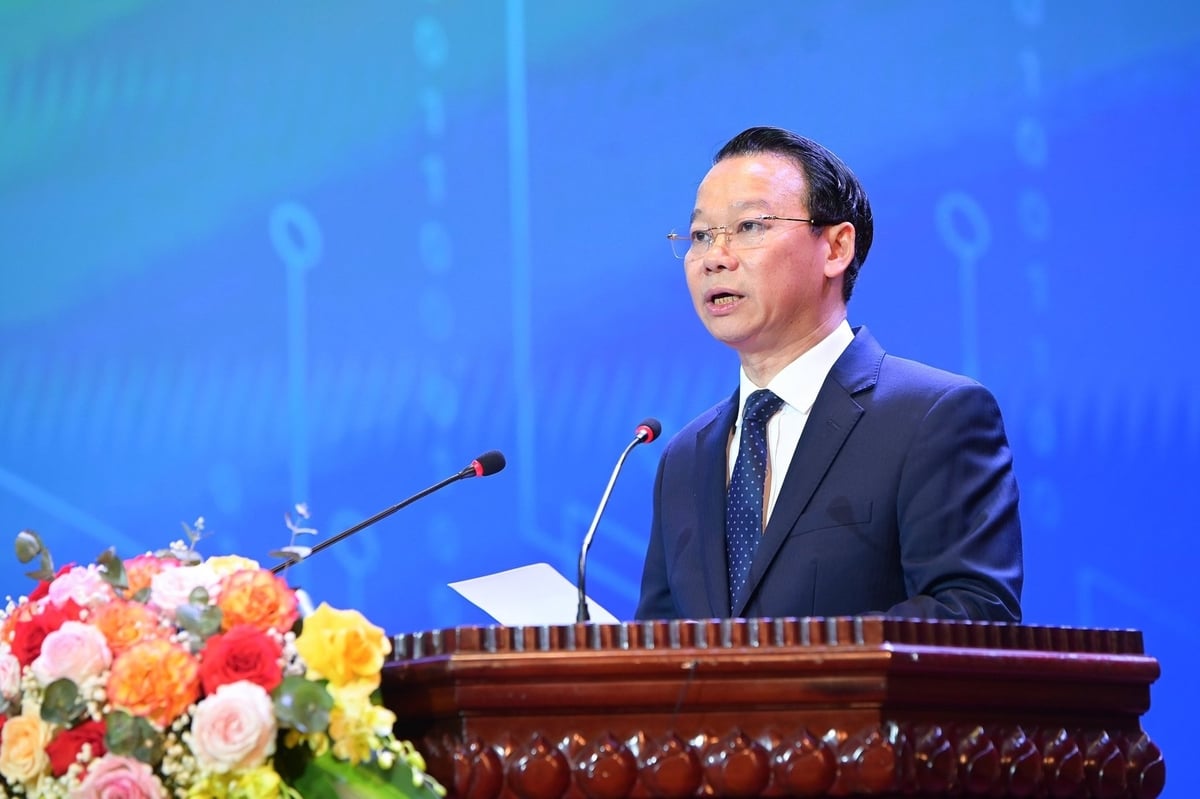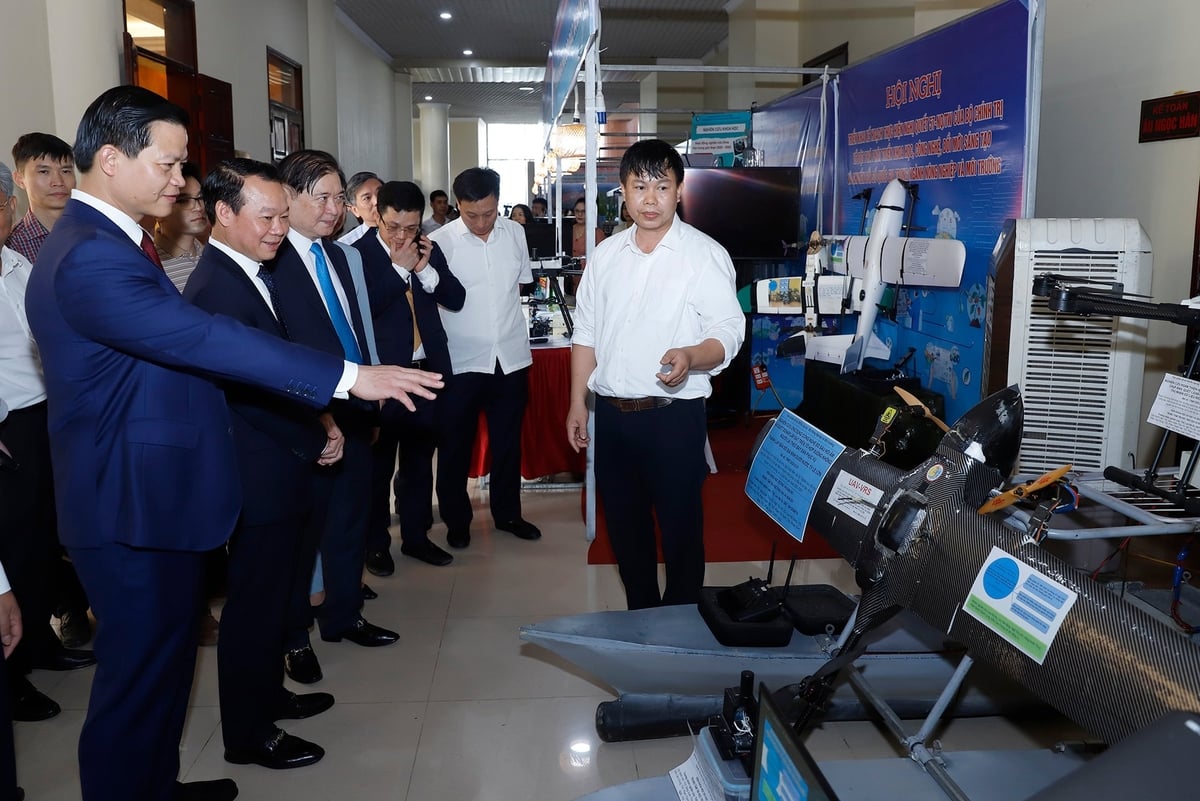October 27, 2025 | 16:23 GMT +7
October 27, 2025 | 16:23 GMT +7
Hotline: 0913.378.918
October 27, 2025 | 16:23 GMT +7
Hotline: 0913.378.918
The provincial People's Committee of Bac Ninh and the Ministry of Agriculture and Environment (MAE) held a conference on May 10 to implement the "Plan for implementing Resolution No. 57-NQ/TW of the Politburo on breakthroughs in the development of science, technology, innovation, and national digital transformation" in the fields of agriculture and the environment.
Minister of Agriculture and Environment Do Duc Duy underscored in his opening remarks that the sector's strong interest and close cooperation in the process of shaping a new phase of development, which is driven by science, technology, and digital transformation, are evidenced by the presence of leaders from central and local ministries and agencies, experts and scientists, representatives of enterprises, cooperatives, international organizations, and the media.

Minister of Agriculture and Environment Do Duc Duy delivering speech at the opening ceremony of Conference on implementing the “Action Plan for Resolution No. 57-NQ/TW of the Politburo on breakthrough development in science, technology, innovation, and national digital transformation” in agriculture and environment. Photo: Tung Dinh.
According to the Minister, Resolution 57-NQ/TW, issued by the Politburo on December 22, 2024, establishes a strategic direction with a consistent vision. The resolution posits that science, technology, innovation, and digital transformation are not only critical factors for sustainable development but also "the best opportunity" for Vietnam to become a developed, prosperous, and powerful nation in the new era.
Agriculture and the environment, under significant pressure from climate change, resource depletion, environmental pollution, and water security, have been designated as "strategic frontiers" for innovative implementation.
The conventional agricultural production model, which includes manual labor, high input costs, and minimal added value, is no longer suitable.
In the interim, the urgency of emerging trends, including circular agriculture, multi-value agriculture, green transition, and digital transformation, is rising.
"We must innovate our methods and our thinking to alter the landscape; development must be based on science, technology, and digital transformation," Minister Do Duc Duy stated.

Minister Do Duc Duy affirms that science, technology, and digital transformation are the foundations for creating breakthroughs in the agriculture and environment sectors in the new era. Photo: Tung Dinh.
Assessments indicate that the agriculture and environment sectors have substantially progressed in applying science, technology, and digital transformation. This includes digitalizing land, forest, and meteorological data, as well as developing high-tech agricultural models and smart livestock farming. Nevertheless, there is still a significant amount of work to be done to achieve the objective of "breakthrough development" as outlined in the spirit of Resolution 57.
Minister Do Duc Duy states that this conference's primary focus is the MAE's Decision No. 503, dated March 27, 2025. The decision delineates seven critical groups of tasks and solutions.
In addition, the conference allows delegates to exchange ideas and suggest priority solutions, designed to create a turning point in the practical application of science, technology, and digital transformation to the sector's development.
The Minister introduced five fundamental topics for delegates to deliberate upon during his address:
First, improving institutions, policies, and administrative procedures to remove bottlenecks and unlock the flow of innovation in both the public and private sectors. The effective mobilization of domestic and international resources for science and technology will be paramount.
Secondly, identifying and concentrating on high-potential science and technology areas, such as biotechnology and gene technology, enhances product quality, conserves resources, and contributes value to the agriculture and environmental sectors.

Minister Do Duc Duy and Chairman of the Bac Ninh Provincial People's Committee Vuong Quoc Tuan visit science and technology exhibition booths at the Conference. Photo: Khuong Trung.
Third, the network of public science and technology organizations will be reorganized to create more efficient and streamlined systems capable of knowledge transfer and market competitiveness. The assignment of scientific tasks will transition to a commissioning and tendering mechanism that is closely connected to production realities and designed to commercialize research outputs.
Fourth, the establishment of a highly skilled workforce in the fields of science, technology, and digital transformation, with a strong connection between research, training, and practical application. In particular, it is imperative to establish mechanisms that will attract experts and scientists from both within and outside the country, particularly from the private sector, to participate in significant national missions.
Fifth, foster a comprehensive digital transformation that encompasses policymaking, governance, production, and consumption to establish the digital economy, digital technologies, and digital data as genuine competitive advantages in the new development phase.
Minister Do Duc Duy expressed the expectation that the conference would serve as a constructive beginning for the practical implementation of Resolution 57-NQ/TW's primary concepts in the agriculture and environment sectors.
The sectors can genuinely break through and establish new growth drivers in the digital age with the collaboration of local governments, businesses, the scientific community, and the media, as well as determined and bold actions.
Translated by Linh Linh

(VAN) Viet Nam is emerging as a strong potential contributor to the ASEAN Economic Community, thanks to its outstanding competitiveness in manufacturing and production.

(VAN) On October 25, the VDDMA received emergency aid from Singapore for people affected by recent disasters.

(VAN) The Viet Nam Academy of Science and Technology and the Finnish Meteorological Institute have signed a five-year Memorandum of Understanding.

(VAN) Amid severe salinity intrusion, the groundbreaking of Dong Tam Water Plant marks a milestone for sustainable water security in the Mekong Delta.

(VAN) Ireland's delegation and the Mobilization Committee of the Vietnam Green Transition Association visited low-emission agricultural models.

(VAN) With 100% of deputies voting in favor, the 15th National Assembly approved Mr. Tran Duc Thang as Minister of Agriculture and Environment for the 2021-2026 term.

(VAN) Building on the commitment to advance the Strategic Partnership, the two countries’ agriculture will reach a consensus on a cooperation framework in November.